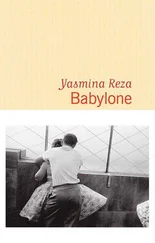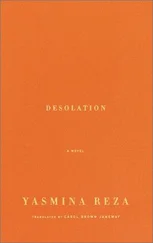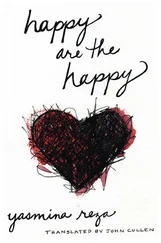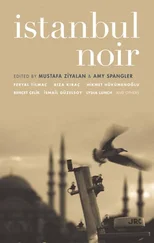He gets up brusquely and says, Marie-Thérèse I must go home. She says, so soon? He replies, I can't stay any longer. She asks if he's separated from his wife. He replies that he's not separated from his wife, why should he be, and demands a taxi straightaway. Marie-Thérèse says, it's rare, you know, men who are free in the evening at the last moment. But not as rare, he feels like replying, as men capable of burying themselves alive with one great shovelful after another. Do you know a number here? he says.
“I'll take you back.”
“You're not going to do the journey there and back again. Call a taxi.”
“It'll cost you a fortune.”
“That's not a problem.”
“What's the matter with your eyes?”
“Nothing.”
“You keep covering your eye with your hand.”
“It's nothing.”
“What is it?”
“A speck of dust, Marie-Thérèse! It'll pass.”
“Don't get annoyed. Why are you shouting?”
“Call one, please.”
Marie-Thérèse goes back into the room at the end of the corridor. For a moment he hears nothing. The noise of the refrigerator, birdcalls coming in waves, some of them as soft as plucked strings, voices in the fog, he thinks. He looks at the flower in its pot on the low table. He notes also, closer and barely perceptible, the crackling of the altar candle. He looks at his shoes, still damp from the rain, his trouser bottoms, too. I must go home, he thinks. Marie-Thérèse returns with a little booklet for the area. I'll try the stands, she says. I'm calling the train station, she says, dialing a number. The ringing at the other end of the line can be heard. An immediately futile ringing, he thinks, who's going to be waiting at the station terminal at night in Viry-Châtillon? Marie-Thérèse hangs up. The market terminal is hardly worth trying, she says, dialing another number. Again a long unanswered ringing in the receiver. Marie-Thérèse stares out at an opaque horizon beyond the French door on the lake side. Then she gives up. I'll try a company in Juvisy, she says, failing that we'll call the Taxis Bleus. On the low table, beside the trefoil-shaped ashtray where the black cinders have leveled off, is the tray with the empty cherry liqueur glasses and the saucer the Tue crackers were on. Also the glass of water and the torn sachet of Veinamitol. Hello, bonsoir , Marie-Thérèse suddenly shouts, 2, Rue Claude-Debussy in Viry. Viry-Châtillon, she repeats, increasing the volume by a notch. At the other end Adam can hear a woman's voice. In Paris, shouts Marie-Thérèse. A Xantia? She yells, fine, thanks. A gray Xantia in fifteen minutes, she says, putting down the telephone. Another quarter of an hour, thinks Adam. She's hung up. They're standing. Finally she says, we could sit down for a few more minutes? She says it like a question, she doesn't dare make the decision. So they remain standing, for even if he wanted to grant her that little favor his knees refuse to bend and his body to return to the armchair. A return to the armchair, he thinks, incompatible with his wish to hurt, to indicate his desire to be gone and the superior urgency of his real life. On the other hand, he thinks, am I going to stay on my feet for a quarter of an hour? Whether I'm sitting down or standing up the thing to be feared is time stretching out. Which, in his experience, it never does at moments of happiness. What kind of cavity in existence have I fallen into to be worrying about whether I'm sitting or standing? He sits on the very edge of the armchair, a position both uncomfortable and pathetic, he notes. He picks up the class photo, as he would pick up a brochure in a waiting room, an ultimate gesture of boredom, he thinks of the line of Borges: the meager yesterdays of photographs. Alice Canella is blurred. Hervé Cohen and Tristan Mateo are blurred. Demonpion, Serge Gautheron, Lyoc and Haberberg and those whose names he doesn't know, the faces studied a few moments before, are, so to speak, erased. He raises his hand. His fixation being to look with the bad eye, he raises his hand at once, but stops halfway and contents himself with shutting one eye, for Marie-Thérèse, that vulture, is observing everything, hungry for disaster, he hates her viscous solicitude, people who meddle with your health are malevolent people, people who categorize you as ill and are on the lookout for serious trouble. So he shuts one eye. And sees nothing. An indistinct gray mass. But you've never known how to wink, he tells himself, you always screwed your face up and you always saw a blur. He covers the good eye with his hand. The faces do not appear. With a beating heart he brings the photo close to the candle and receives only a vaguely turbulent impression. I'm blind, he thinks. He covers the bad eye. The faces recover their nebulous clarity. You're lucky, the optometrist had said, the vascular incident could have occurred anywhere else at all, not excluding your brain, the thrombosis could have affected a vital organ. Do we both have the same understanding of what is vital , Doctor? Can one even talk to people who don't consider the loss of one of one's senses as a vital loss? And don't you tell me you've lost only an eye, you haven't lost your sight. Someone who's lost one eye, Doctor, knows that he can lose the second, what struck the first could very well strike the second, especially in an individual suffering from a genetic anomaly, a single eye contemplating half a world is more vulnerable, besides, it's also threatened by the glaucoma, my God, the glaucoma, he thinks, what a horrible word it is too, maybe I should go tonight to get my visual field test done in the emergency room at the Quinze-Vingt eye hospital, why wait three weeks, these doctors have no sense of time. When will they understand that anxiety aggravates the disease, that waiting's a killer, waiting destroys me, Doctor, I speak as an expert, oh I've pressed my face against the glass, I did it for real at a time in my youth when I lived beside the Seine in Boulogne, I used to watch the river and the barges, I watched life passing by outside, my years were swallowed up by the void. Beside Demonpion in the photo he recognizes the hazy, puffed-up face of Nana Sitruk. What has become of Nana Sitruk, who never even got her diploma, he remembers, a housewife, a mother, a postal clerk, Nana Sitruk, vanished into life like the others, one becomes nothing, he thinks, one never becomes anything. One day, who knows, in some Jewish cemetery or other it may be possible to see the names Nana Sitruk and Adam Haberberg, engraved there in the same row, words translated from the night, monotonous stone inscriptions beneath the same sky. One day the older boy on his return from vacation had said to Irene, Mummy, you've got to tell me what you do to make people miss you so much. Nobody misses me apart from you and Daddy. He used to go to summer camp, too. He didn't like the camp but he liked the mountains. Had the boy liked the mountains? Had he liked the footpaths, the tangled roots, the thousands of pine needles? Did you like the footpaths that twist and turn who knows where, I'll wake you when I get home tonight and ask you how you run along the thorny paths. I want to see the children, I want to go home. I want to see Irene, I want to roll into a ball, curl up like a dog, its paws tucked in under its legs, I'm tired, I'm tired of falling apart, I'm afraid. Tuck me up, Irene. I don't understand what's happening to me. Marie-Thérèse has sat down on the sofa. She's lit another cigarette and says, do you want my glasses? She studies me, she observes the least of my gestures, these people who have no lives of their own dissect other people — what would I want with her glasses?
“Give me, give me the glasses!” reaching out across the table, a desperate, crustacean-like arm.
Читать дальше












